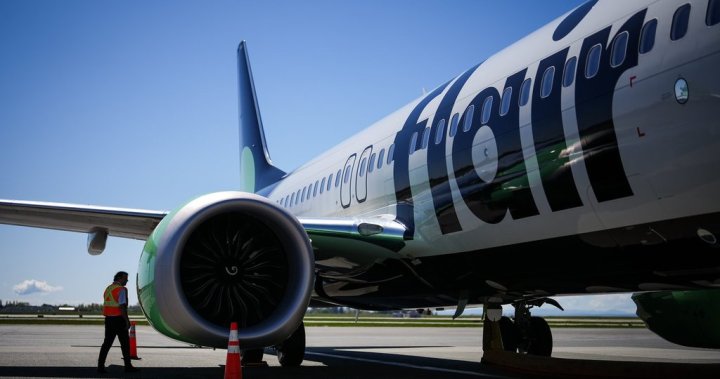Article – When an upstart airline goes toe-to-toe with the industry’s biggest players, every detail matters—especially the ability to keep your aircraft in the air. For Flair Airlines, Canada’s ultra-low-cost carrier with ambitions of disrupting the Air Canada-WestJet duopoly, a brewing dispute with aircraft leasing companies threatens to complicate its flight path.
According to recent court filings, several aircraft leasing companies have leveled serious allegations against the Edmonton-based airline, claiming Flair has failed to make timely payments on its leased Boeing 737 aircraft. The accusations come at a particularly sensitive moment for the Canadian airline industry, which continues to navigate post-pandemic turbulence and heightened consumer scrutiny.
“We’ve seen this movie before,” says aviation analyst Robert Kokonis of AirTrav Inc. “When leasing companies start publicly raising concerns about payment timing, it often signals deeper operational challenges that investors and passengers alike should monitor.”
The court documents, filed in Ontario Superior Court, allege that Flair has consistently fallen behind on monthly payments for at least seven aircraft in its fleet. One lessor claims outstanding payments exceed $4 million, while others suggest the airline has been requesting payment extensions since late 2023.
Flair Airlines, meanwhile, presents a different narrative. In a statement to Mediawall.news, the company characterized the situation as “standard business negotiations” and emphasized that no aircraft have been grounded due to payment issues.
“Like any prudent business, we continuously review and sometimes renegotiate contract terms with our partners,” said Flair’s Chief Commercial Officer Garth Lund. “All our leased aircraft remain in active service, and we’re fully committed to our growth strategy in the Canadian market.”
But industry experts point out that aircraft leasing disputes can quickly escalate from paperwork to operational disruptions. In March 2023, Flair experienced precisely this scenario when four of its Boeing 737 MAX aircraft were seized by lessors over payment disputes, forcing the airline to cancel numerous flights and hastily lease replacement aircraft.
“Aircraft lessors don’t typically rush to court unless conventional collection methods have failed,” explains Margaret Trethewey, aviation finance attorney with Toronto-based Skypath Legal. “The leasing market remains tight globally, and lessors can often redeploy aircraft to other airlines willing to pay market rates promptly.”
For Canadian consumers, the dispute raises questions about the sustainability of the ultra-low-cost carrier model in Canada’s challenging aviation landscape. Flair has positioned itself as the budget-friendly alternative, offering base fares as low as $49 between major Canadian cities while charging extra for virtually everything else—from carry-on bags to seat selection.
This price-sensitive strategy requires exceptional operational efficiency and tight cost control. Any additional expenses, such as penalty interest on late lease payments or the potential need to quickly secure replacement aircraft, could strain Flair’s already thin margins.
Transport Canada declined to comment on the specific allegations but confirmed that it monitors all Canadian carriers’ compliance with financial fitness requirements as part of its ongoing oversight responsibilities.
The timing of these allegations couldn’t be more challenging for Flair. Summer travel season—traditionally the most profitable period for Canadian airlines—is approaching, and competitors aren’t standing still. Both Air Canada and WestJet have been aggressively defending their market share, while newcomer Lynx Air continues expanding its ultra-low-cost footprint across the country.
“The Canadian aviation market is notoriously difficult to crack,” notes Cameron Doerksen, transportation analyst at National Bank Financial. “High airport fees, vast geography, and seasonal demand patterns create significant hurdles for any new entrant, especially those operating on thin margins.”
For passengers with upcoming Flair bookings, consumer advocates recommend purchasing travel with credit cards that offer trip interruption protection and considering travel insurance that covers airline insolvency—standard advice for any carrier but particularly relevant when booking with smaller airlines facing financial headwinds.
Flair’s lease payment challenges also highlight the complex economics of aircraft ownership in modern aviation. Most airlines—even industry giants—lease rather than purchase a significant portion of their fleets. This approach preserves capital but creates ongoing payment obligations that must be met regardless of seasonal fluctuations or operational challenges.
“Aircraft leasing is the backbone of modern aviation,” explains aviation economist Martin Ferguson of AeroDynamics Advisory. “Monthly lease payments for a Boeing 737 typically range from $200,000 to $350,000 per aircraft. For an airline with 20+ planes, that’s a substantial fixed cost that must be covered before a single dollar of profit can be realized.”
Despite these challenges, Flair maintains that its fundamentals remain strong. The airline reported carrying over 4 million passengers in 2023, a company record, and continues to expand its route network with new destinations announced for 2024.
The dispute underscores a fundamental tension in Canada’s aviation ecosystem: Consumers want and deserve more competition and lower fares, but building a sustainable challenger to established carriers requires time, capital, and operational excellence.
As the legal process unfolds, Canadian travelers will be watching closely to see whether Flair can navigate these financial headwinds while keeping its promise of affordable air travel. For an industry accustomed to turbulence, this latest dispute represents yet another test of whether Canada’s aviation market can successfully support a true low-cost alternative.






